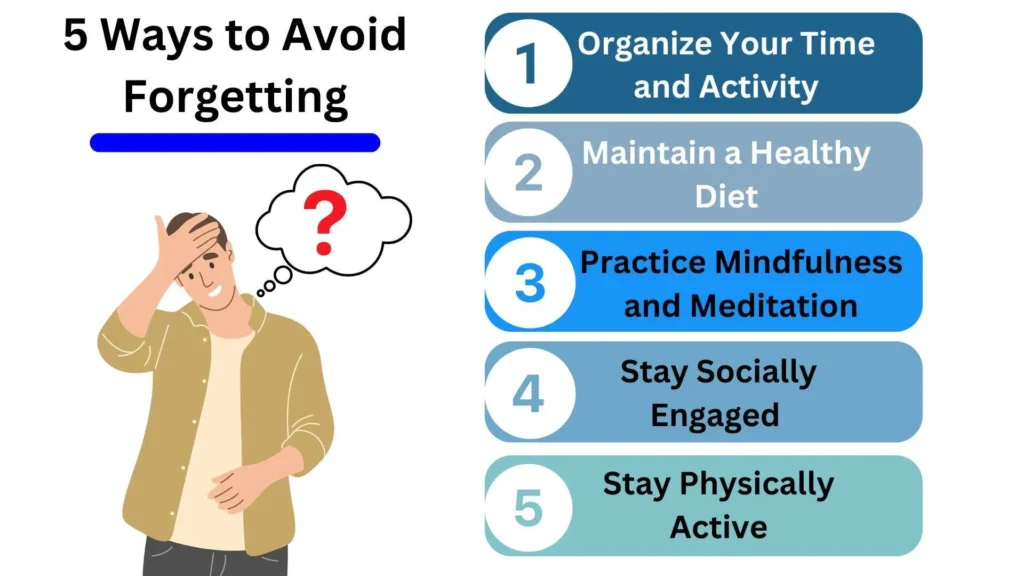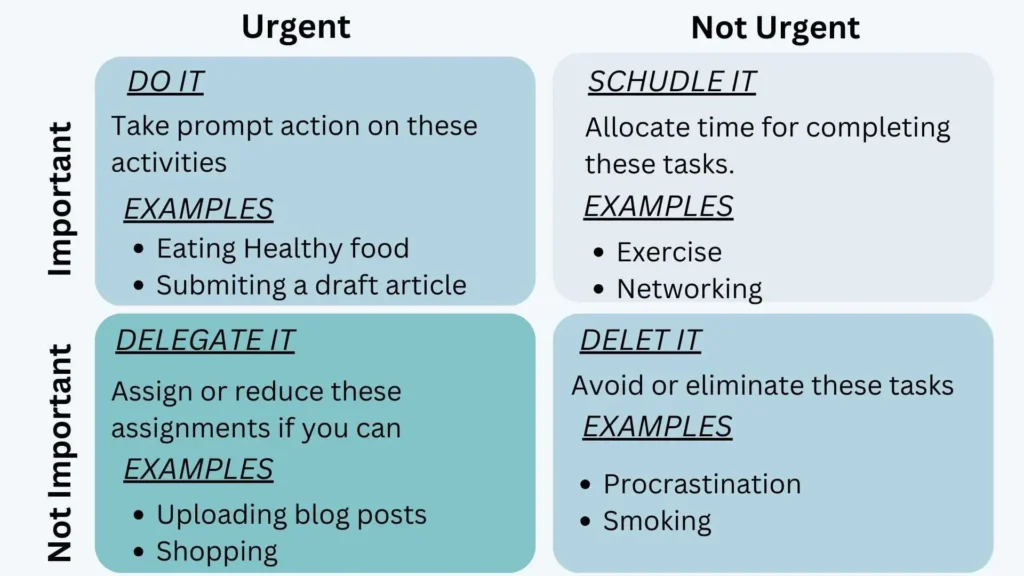Memory plays an important role in our daily lives, helping us navigate tasks, recall important information, and maintain our personal and professional responsibilities.
Yet, forgetfulness is a common struggle that affects many of us. Whether misplacing keys, missing appointments, or forgetting names, these lapses can be frustrating and disruptive.
I have explored numerous ways to enhance and sustain memory based on neuroscience research. This article examines the causes of forgetfulness and provides practical ways to break the habit of forgetting.
Table of Contents
What is Forgetfulness?
Forgetfulness is the inability to recall information or events that should be readily available to our conscious mind. It impacts our daily activities, leading to missed deadlines, lost items, and strained relationships. Understanding the root causes of forgetfulness is the first step towards addressing it.
Causes of Forgetting in Psychology
Memory involves three fundamental processes: encoding, storage, and retrieval. Information is first learned through encoding, then maintained over time through storage, and finally retrieved when required. Disruptions in any of these processes can lead to forgetfulness.
- Stress and Anxiety: The brain’s capacity to store and recall information might be hampered by high levels of stress and anxiety.
- Lack of Focus and Attention: When we do not pay enough attention to information, it is less likely to be encoded and stored effectively.
- Brain Health and Aging: As we get older, our brain’s ability to store and retrieve information may deteriorate.
- Medical Conditions and Medications: Certain medical conditions and medications can impact memory function.
5 Best Ways to Break the Habit of Forgetting
We can stop any bad habit permanently. Follow the following best ways to break the habit of forgetting.

1. Organize Your Time and Activity
Organizing your time and activities helps memory by reducing cognitive load. With a clear plan and structure, your brain can focus on encoding and retrieving important information rather than juggling multiple tasks simultaneously. This structured approach minimizes the chances of forgetting crucial details.
Using Calendars and Planners
Digital calendars and apps are invaluable tools for managing your schedule and managing your time which is a healthy habit for men. Apps like Google Calendar, Microsoft Outlook, and Todoist allow you to set reminders, schedule appointments, and create to-do lists. You can stay organized with the aid of these tools and break the habit of forgetting.
Physical Planners
Physical planners can be equally effective for those who prefer a tangible method. Writing down tasks and appointments helps reinforce memory through the act of writing. It also gives you a visual summary of your schedule, facilitating planning and prioritization.
Prioritizing Tasks Effectively
The Eisenhower Matrix is a valuable tool for setting task priorities according to importance and urgency. It categorizes tasks into four quadrants.

- Urgent and Important: Take prompt action on these activities.
- Important but Not Urgent: Allocate time for completing these tasks.
- Urgent but Not Important: Assign or reduce these assignments if you can.
- Neither Urgent nor Important: Avoid or eliminate these tasks.
You can focus on what truly matters. This method helps you streamline your efforts and allocate time more effectively, reducing the risk of forgetting important tasks.
2. Maintain a Healthy Diet
What we eat has a profound impact on brain function and memory. To operate at its best, the brain needs a range of nutrients. A well-balanced diet provides these vital nutrients, supporting cognitive processes like learning, memory, and focus. Adopting healthy habits, including proper nutrition, ensures your brain receives the fuel to perform optimally.
A diet high in antioxidants, healthy fats, vitamins, and minerals can help protect the brain from inflammation and oxidative stress, both of which have been associated to memory loss and cognitive decline.
Eat food enrich with the following to stop the habit of forgetting.
Omega-3 Fatty Acids
Omega-3 fatty acids in fatty fish such as salmon, mackerel, and sardines are essential for brain function. These good fats support brain cell structure and enhance communication between them. Research demonstrates that omega-3 fatty acids can improve cognitive abilities and lower the risk of dementia, including Alzheimer’s disease.
Antioxidants
Fruits and vegetables rich in antioxidants help protect the brain from oxidative stress. Antioxidants like flavonoids, found in berries such as blackberries, strawberries, and blueberries, have been shown to boost memory and cognitive performance.
Vitamins and Minerals
Minerals and vitamins, particularly vitamins K, E, and folate, are required for brain function. Broccoli, kale, and other leafy greens are rich in these nutrients. According to research, a diet high in these vitamins may help sustain memory recall and minimize cognitive decline.
Whole Grains
Glucose is the brain’s primary energy source, and whole grains such as quinoa, brown rice, and oats consistently deliver this. Eating whole grains can improve focus and memory while also helping to keep blood sugar levels constant.
3. Practice Mindfulness and Meditation
Mindfulness and meditation are effective practices for enhancing memory and mental clarity. While meditation frequently entails concentrated breathing and mental exercises to calm the mind, mindfulness is giving the current moment your whole attention without passing judgment.
Mindfulness practice helps reduce stress and anxiety, which impair memory and can help you to break the habit of forgetting. By staying present and attentive, you can process information more effectively and retain it for extended periods.
It has been shown that mindful meditation, in particular, enhances brain function. It increases gray matter density in brain regions related to memory, learning, and self-awareness.
Research shows that individuals who practiced mindfulness meditation for eight weeks experienced growth in the hippocampus, a region crucial for memory and learning.
Incorporate mindfulness into your daily activities by paying full attention to whatever you are doing. Whether eating, walking, or washing dishes, engage all your senses and stay present.
This practice enhances overall mindfulness and helps improve memory by creating strong mental associations with tasks. By staying healthy and mindful of personal habits, you support your cognitive function and general well-being.
4. Stay Engaged Socially
Engaging socially provides mental stimulation that is crucial for maintaining cognitive health. Conversations, group activities, and social events challenge the brain to think, remember, and respond. This constant mental exercise helps keep memory functions intact and prevents forgetfulness.
Social interactions also offer emotional support, which plays a significant role in reducing stress and anxiety. The American Psychological Association states positive social support is linked to better mental health and improved cognitive function.
High-stress levels can negatively impact memory, so developing healthy relationship habits can help mitigate this risk.
You can socially engage yourself in different ways,
- An excellent method to maintain social interaction is joining clubs and associations relevant to your interests. Joining groups for hobbies, sports, or books offers the chance to socialize with new people and have deep discussions.
- Volunteering is another excellent way to stay engaged socially. It allows you to connect with others while contributing to a cause you care about.
- Attending social events such as parties, community gatherings, and cultural events can help you stay connected with others.
5. Stay Physically Active
Physical activity has been demonstrated to have various advantages for brain health, including improved memory and cognitive performance. Exercise boosts blood flow to the brain, providing more oxygen and nutrients. This improved circulation benefits brain function and memory.
John F. Kennedy said, “Physical fitness is not only one of the most important keys to a healthy body; it is the basis of dynamic and creative intellectual activity.”
Physical activity facilitates neurogenesis or the creation of new neurons in the brain. This is especially advantageous for the hippocampus, a portion of the brain linked to learning and memory. According to a University of British Columbia study, regular aerobic exercise increases hippocampal growth, which improves memory.
Exercise helps reduce inflammation and lower stress levels, which negatively impact memory. Endorphins are naturally occurring mood enhancers that reduce tension and anxiety, and they are released when you exercise. Lower stress levels contribute to better memory retention and recall.
Different types of physical activity enhance memory,
- Aerobic workouts include cycling, swimming, walking, and running.
- Exercises involving strength, including resistance training and weightlifting.
- Mind-body exercises, such as tai chi and yoga, integrate mental concentration with physical activity, benefiting the body and the brain.
These activities promote relaxation, reduce stress, improve memory and reduce the habit of forgetfulness effectively.
How to Overcome Forgetfulness at Work
Forgetfulness at work can hinder productivity, lead to missed deadlines, and cause important details to slip through the cracks. Fortunately, several practical strategies exist to help you overcome forgetfulness at work and maintain good work habits.
Use a Planner or Digital Calendar
One of the best strategies to overcome the forgetting problem is to use a planner or digital calendar. These tools assist you in remembering crucial occasions, gatherings, and due dates. Digital calendars are useful. Examples include Apple Calendar, Microsoft Outlook, and Google Calendar.
Physical planners can be just as effective for those who prefer a more tactile approach. They visually represent your day, week, or month at a glance.
I. Prioritize Tasks
Prioritizing activities lets you focus on the most important and urgent things first, lowering the danger of ignoring critical tasks. The Eisenhower Matrix might help you prioritize work.
The Eisenhower Matrix is covered above in Strategy No. 1, which explains how to avoid forgetting. Have a look at that for more details.
II. Break Tasks into Smaller Steps
Large projects can be daunting, leading to procrastination and forgetfulness. Breaking down activities into smaller, more manageable steps makes them less intimidating and more accessible to remember.
Make a to-do list that includes every step necessary to complete a larger project. This simplifies the job and provides a sense of accomplishment as you complete each small step.
Another helpful method is to block time. Set aside specified time intervals for each item on your schedule. This ensures that you allocate time to each stage and stay on schedule.
III. Take Notes during Meetings
Taking notes during meetings helps capture vital information and reduces the risk of forgetting crucial details at work. Use bullet points, headings, and highlights to organize your notes. This makes it easier to review and locate essential information later.
Microsoft OneNote, Evernote, and Google Keep are great for digital note-taking. They include search options, tagging, and interaction with other apps to make organizing and retrieving information easier.
IV. Create a Conducive Work Environment
A well-organized and distraction-free work environment can significantly improve focus and memory. Keep your desk clean and organized. A clutter-free workspace reduces distractions and makes finding important documents and tools easier.
Conclusion
Breaking the habit of forgetting requires understanding its causes and actively working on effective ways to avoid it. Adopting techniques like organizing, prioritizing tasks, and staying engaged can dramatically improve your memory, whether at work or in your personal life.
Start implementing these simple strategies today to enhance your memory and productivity. Remember, breaking the habit of forgetting is not only about improving memory. It’s about enhancing your overall quality of life.
FAQs
What is the Pomodoro Technique?
The Pomodoro Technique is a time management strategy that employs 25-minute intense work sessions separated by 5-minute breaks. After four intervals, you take a 15-—to 30-minute break. This strategy boosts productivity and concentration by instilling a sense of urgency, providing regular break periods, preventing burnout, and ensuring consistent performance.
Why is mental stimulation important for memory?
Mental stimulation is essential for memory since it helps to maintain and build neural networks in the brain. Puzzles, learning new abilities, and reading are all examples of mind-challenging activities that promote neuroplasticity, the brain’s ability to change and rearrange itself. This ongoing cognitive engagement maintains the brain active and healthy, lowering the risk of cognitive decline and increasing memory retention.




